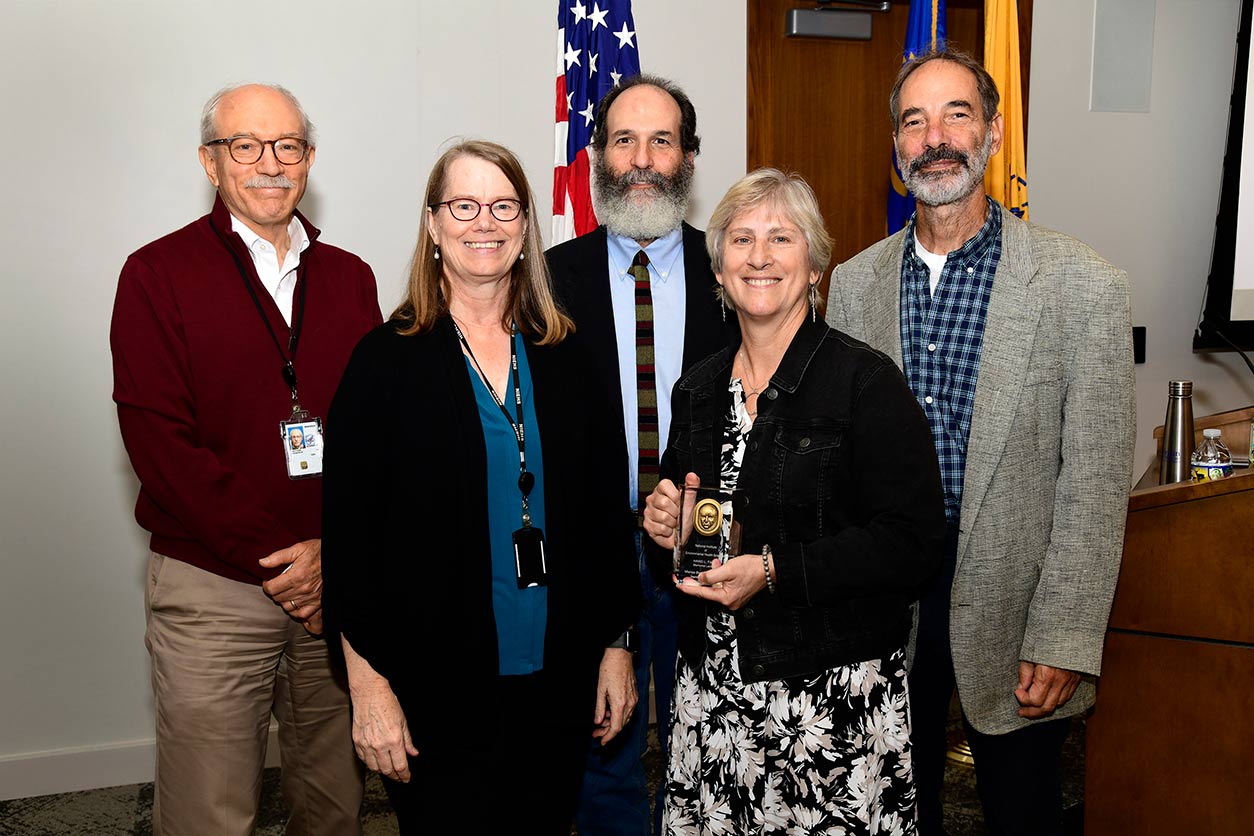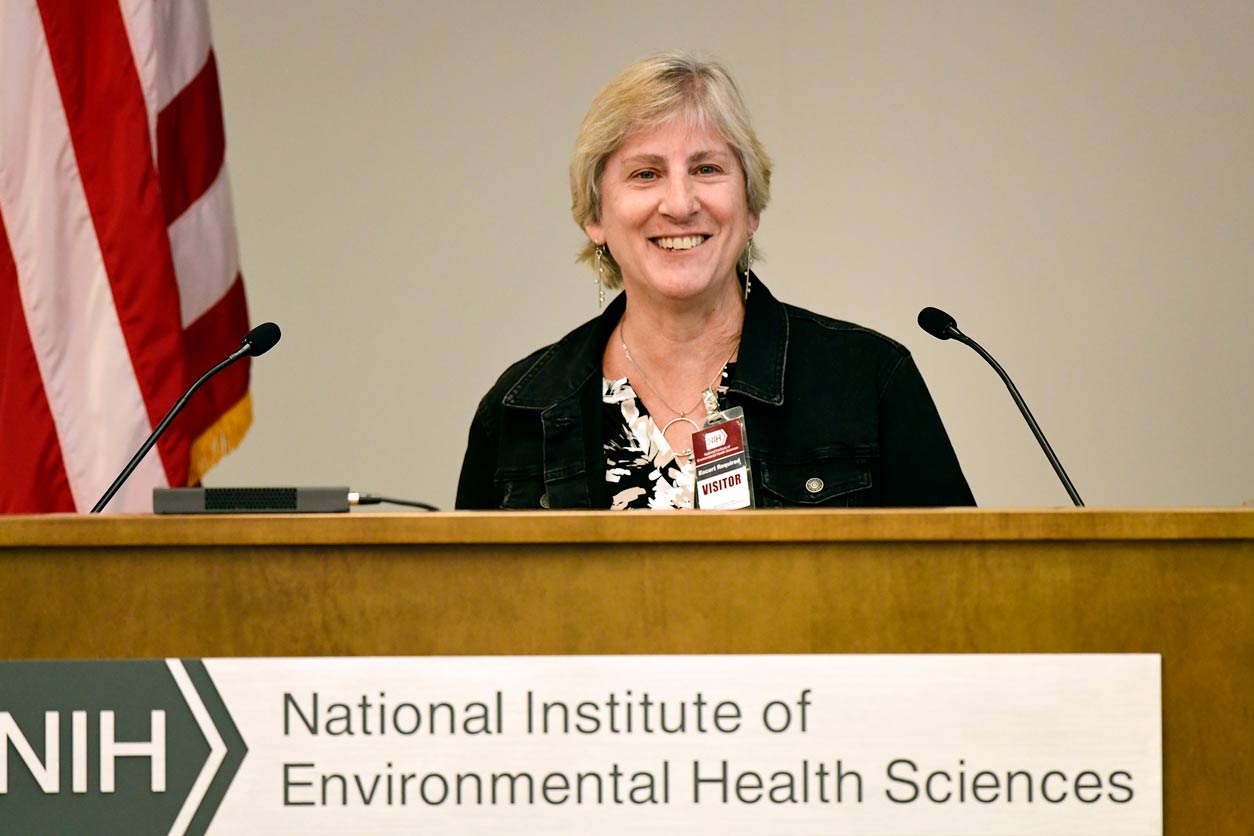Environmental factors and assisted reproductive technologies can alter the way genes are expressed in a developing embryo with potentially adverse effects later in life, according to developmental geneticist Marisa Bartolomei, Ph.D. As the invited speaker for the 2023 NIEHS Hans L. Falk Memorial Lecture, Bartolomei highlighted the contributions she and her research group at the University of Pennsylvania have made to the understanding of gene regulation and human development.
Deputy Chief of the NIEHS Reproductive and Developmental Biology Laboratory Carmen Williams, M.D., Ph.D., hosted the Sept. 14 seminar.
“I attribute a lot of my success to the support she gave me as a graduate student at Penn and continuing until now,” said Williams. “She is an amazing mentor, not just for her trainees but for other trainees, and even junior and senior faculty members.”

Early influences
More than two decades ago, Bartolomei showed that growing mouse embryos in the laboratory under different culture conditions could affect genomic imprinting, the process by which certain genes are silenced based on whether they were inherited from the mother or the father.
As a graduate student, Williams worked with Bartolomei on a follow-up study that revealed that embryos grown in different culture conditions before being implanted into mice became adults that behaved differently depending on those initial growth conditions.
“The study really opened my eyes to the importance of imprinting and doing basic research in an area where we were already applying these methods to human embryos,” said Williams.
Toxicant exposures
Today, Bartolomei continues to investigate how specific environmental exposures disrupt imprinting and, ultimately, gene expression. She tracks these disruptions by looking at a process known as DNA methylation — the attachment of methyl tags to DNA to silence gene expression.
For example, Bartolomei described how she measured robust changes in DNA methylation in a long-term study of pregnant mice exposed to various doses of the endocrine disruptor bisphenol A (BPA). The study was funded in part by the NIEHS Toxicant Exposures and Responses by Genomic and Epigenomic Regulators of Transcription (TaRGET) Program.
Assisted reproductive technologies
The assisted reproductive technology known as in vitro fertilization (IVF) also appears to affect epigenetic changes such as DNA methylation, said Bartolomei. During IVF, a woman is medically stimulated to ovulate multiple eggs. These eggs are retrieved, fertilized with sperm, cultured, sometimes frozen, and then placed into the uterus.
In some cases, embryos undergo preimplantation genetic testing prior to transferring the embryo to the uterus. During this process, several cells from the outside of the embryo — the region that eventually develops into the placenta — are biopsied, or removed, and tested for genetic abnormalities.

More than 9 million babies have been born through assisted reproductive technology, which includes IVF, since the practice began over 40 years ago. Despite this scientific success, Bartolomei said that some children born from IVF can experience adverse effects.
“There have been reports of an increased incidence of imprinting disorders,” she said. These disorders, which include syndromes such as Beckwith-Wiedemann and Angelman, have been linked to DNA methylation abnormalities.
To investigate these links further, Bartolomei simulated IVF and IVF with preimplantation genetic testing in a mouse model. Her team observed epigenetic perturbations, or changes in gene expression, in the cultured mouse embryos, particularly those that were cultured for as long as three to four days.
“A time course revealed that the embryos were initially smaller, which might be the result of vascular defects,” she noted. Over time, the resulting smaller embryos from IVF seemed to “catch up” but the ones biopsied for preimplantation genetic diagnosis did not.
“Basically, we see that IVF plus biopsy generates a lot of DNA methylation changes,” said Bartolomei. “We would argue that these procedures, which are being widely used, need to be used more cautiously.”
(Lindsay Key is a contract writer for the NIEHS Office of Communications and Public Liaison.)










